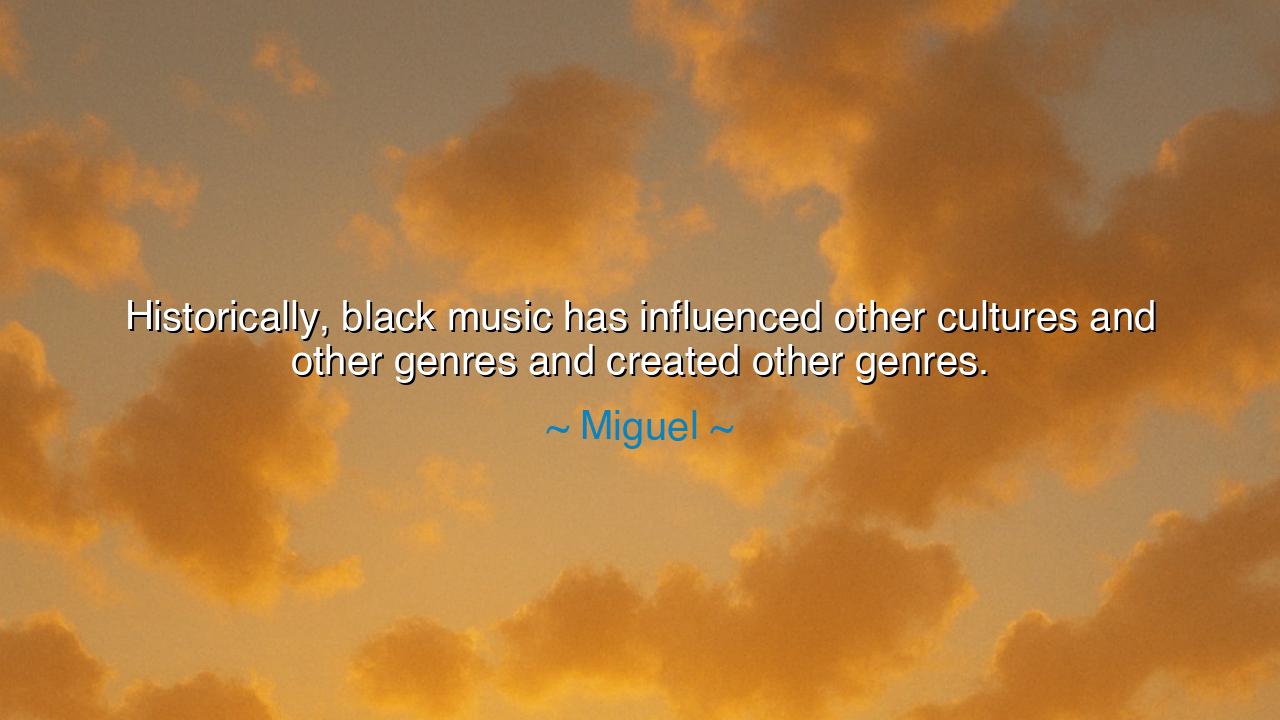
Historically, black music has influenced other cultures and
Historically, black music has influenced other cultures and other genres and created other genres.






Hear the words of Miguel, who declared: “Historically, black music has influenced other cultures and other genres and created other genres.” These words are not casual observation, but a recognition of a river of creativity that has flowed across centuries, shaping not only sound but the very spirit of societies. For black music was born in pain and in resilience, in chains and in struggle, yet from those depths it rose like fire, illuminating the world. Its rhythms, its cries, its beauty have carried across oceans and borders, giving birth to new forms, new voices, and new freedoms.
The ancients knew that art forged in suffering often carries the deepest power. In the Hebrew psalms, songs of captivity became songs of faith. In Greek tragedies, pain became poetry that endured through time. So too in the fields of the American South, the enslaved sang spirituals, songs woven with both sorrow and hope. These were not only laments; they were seeds. From them sprang blues, from blues came jazz, from jazz rock and roll, and from those roots countless other branches grew. Miguel’s words remind us that what began as survival became transformation, shaping the music of entire civilizations.
Consider the story of rock and roll itself. Born from the blues of the Mississippi Delta, carried through gospel, and infused with rhythm and soul, it became the anthem of a generation. Elvis Presley may have been crowned its king, but it was the voices of black musicians—Chuck Berry, Little Richard, Sister Rosetta Tharpe—that laid its very foundation. Their sound was not confined to their community; it reshaped the tastes of the world. What was once dismissed as the music of the margins became the heartbeat of youth rebellion and cultural change.
And look to jazz, that bold and improvisational art, born in New Orleans from the fusion of African rhythms, spiritual hymns, and European harmonies. It spread like wildfire across the globe, influencing classical composers in Europe, inspiring poets of the Harlem Renaissance, and transforming how humanity thought of sound itself. In its freedom, it carried the essence of democracy, of individuality, of life lived boldly. From the cries of trumpets and the sway of saxophones came a voice that the world could not silence.
Miguel’s words are not only about history, but about truth: that black music has never been contained. It always reaches outward, shaping and reshaping, refusing to be locked away. Hip-hop, born in the Bronx from DJs and poets with nothing but turntables and burning voices, is now the most global genre of all. Reggae, born in Jamaica with Bob Marley’s cry for justice, became the anthem of the oppressed in Africa, Asia, and beyond. These are not accidents; they are the natural result of a music forged in struggle and truth, which resonates wherever human beings hunger for freedom.
The lesson is clear: what is born in authenticity cannot be silenced. Black music influenced cultures not because it sought power, but because it carried truth, rhythm, and soul that touched the human condition. When music speaks to pain, joy, longing, and hope, it transcends barriers of race, nation, or language. It becomes universal. And so the world, knowingly or not, has been shaped by the voices of those who once had the least power, but who created the most enduring art.
To you who hear this, take it as counsel: honor the roots of the music you love. Do not forget where it came from, nor the sacrifices that made it possible. If you are a creator, know that your art has power beyond yourself, that it may ripple outward to touch cultures and even create new ones. And if you are a listener, let the music remind you of resilience, of history, of the voices that rose when silence was demanded.
Thus, remember Miguel’s words: “Historically, black music has influenced other cultures and other genres and created other genres.” This is not merely history—it is legacy, living and breathing in every beat we hear today. Let us honor it, learn from it, and carry it forward, knowing that the truest art does not end with one people or one moment, but becomes the shared inheritance of all humanity.






AAdministratorAdministrator
Welcome, honored guests. Please leave a comment, we will respond soon